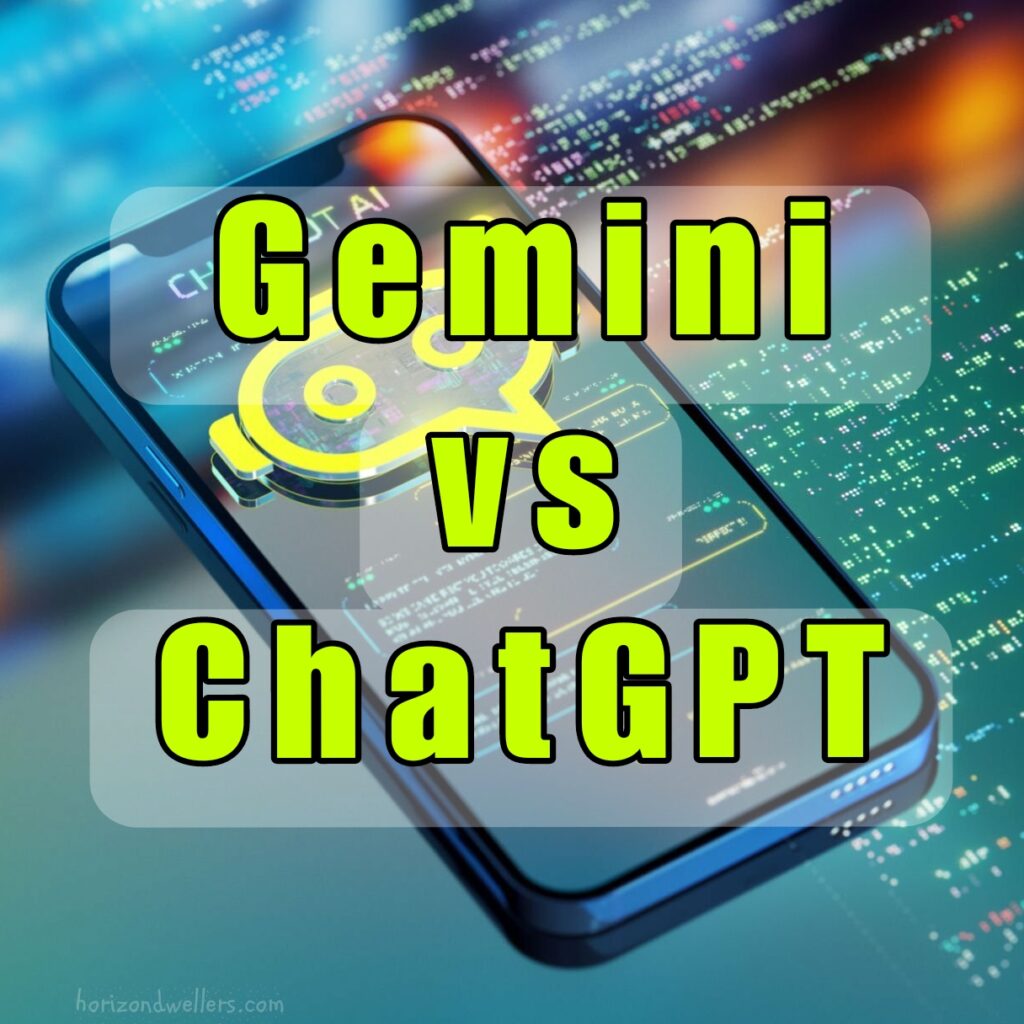In the evolving landscape of AI-powered language models, Gemini and ChatGPT are two prominent players that offer advanced conversational capabilities. Gemini, developed by OpenAI, is known for its natural and human-like dialogues, while ChatGPT, created by OpenAI’s GPT-3, has gained recognition for its versatile and contextually relevant responses. Both platforms have their unique strengths and weaknesses, making it important to compare them in order to determine which one is better suited for specific use cases.
 Pin
Pin Table of Contents
Battle of the Bots
Gemini, initially unveiled in November 2021, is designed to be more relatable and personal in its conversations. Its developers have highlighted its ability to seamlessly switch between topics and maintain coherence throughout a discussion. Gemini’s underlying models are trained to understand and respond to a variety of conversational cues, making it particularly adept at emulating human-like dialogue. Users have praised Gemini for its ability to generate engaging and interactive conversations, thus making it a valuable tool for applications such as customer service chatbots and virtual assistants.
On the other hand, ChatGPT, which builds upon the powerful GPT-3 model, offers a wide range of capabilities beyond just conversational dialogues. With the ability to generate text across various genres and formats, ChatGPT is known for its flexibility and adaptability in generating high-quality content. Its extensive training data enables it to generate contextually relevant responses and provide deeper insights on a wide range of topics. However, some users have noted that ChatGPT’s responses may occasionally lack the personal touch and fluidity found in Gemini’s conversations.
When comparing the two platforms, it’s crucial to consider the specific requirements of the intended application. For scenarios where personalized, engaging conversations are paramount, Gemini may be the preferred choice. Its ability to emulate human-like responses and maintain a coherent dialogue flow could make it an ideal solution for customer-facing chatbots and virtual assistants.
Alternatively, for applications that require generating a variety of text-based content at scale, ChatGPT’s broader capabilities and contextual understanding may offer greater utility. Its versatility in generating text for diverse purposes, such as content creation, language translation, and summarization, makes it a robust choice for a wider range of applications.
Additionally, it’s essential to consider the technical requirements and integration capabilities of each platform. Gemini’s API offers seamless integration for developers, while ChatGPT’s extensive documentation and developer resources make it relatively straightforward to implement.
Ultimately, the decision between Gemini and ChatGPT depends on the specific needs and use cases. Both platforms excel in their respective strengths, and understanding these nuances is essential for making an informed decision on which platform is better suited for a particular application. As the field of AI language models continues to advance, it’s likely that both Gemini and ChatGPT will further improve and expand their capabilities, offering users an even broader array of features and applications to choose from.
What is Gemini AI?
Gemini AI is a new and advanced language model developed by Google, which has the ability to process various types of media such as text, images, video, audio, and code. This AI tool comes in three different variants – Gemini Nano, Gemini Pro, and the upcoming Gemini Ultra, which are tailored to meet different user needs.
Compared to its predecessor, Gemini AI is more powerful and capable, showcasing its multimodal features that can efficiently handle different types of media.
Gemini Pro, a middle-tier version with advanced text-based capabilities, has been integrated into Google Bard, allowing for more accurate and high-quality responses. The current version of Bard is similar to ChatGPT, which uses the GPT-3.5 model, a predecessor of the GPT-4 used in the more advanced variant, ChatGPT Plus.
Gemini Pro and ChatGPT-3.5 were compared in several benchmark tests to evaluate their language understanding, arithmetic reasoning, code generation, and math abilities
- Gemini Pro in Language: Gemini Pro outperformed GPT-3.5 in language understanding with a score of 79.13% compared to 70%.
- Gemini Pro in Code Generation: In the code generation test, Gemini Pro also scored higher with 67.7% compared to 48.1% for GPT-3.5.
- Gemini Pro in Arithmetic Resoning: It also excelled in arithmetic reasoning with a score of 86.5% compared to 57.1% for GPT-3.5.
- Gemini Pro in Maths: However, GPT-3.5 performed better in the math category with a score of 34.1% compared to 32.6% for Gemini Pro. Additionally, Gemini Pro is the first model to outperform human experts in the language understanding test.
Text processing in Gemini Pro and ChatGPT
The Gemini Ultra and GPT-4 models were compared in various text processing tasks, with Gemini Ultra showing superior performance in several areas.
- In the MMLU test, Gemini Ultra scored 90.0%, surpassing GPT-4’s 86.4% in a 5-shot setting. Similarly, in the Big-Bench Hard benchmark test, Gemini Ultra scored 83.6% compared to GPT-4’s 83.1% in a 3-shot API configuration, demonstrating its strong multi-step reasoning capabilities.
- In the DROP (Discrete Reasoning Over Paragraphs) assessment for reading comprehension, Gemini Ultra received a score of 82.4 (variable shots), outperforming GPT-4’s 80.9 (3-shot setting). In the GSM8K test, Gemini Ultra demonstrated its strength with a score of 94.4%, while GPT-4 scored 92% in a 5-shot COT setting.
- When it came to more challenging math assessments including algebra and geometry, Gemini Ultra was slightly ahead with a score of 53.2% in a 4-shot setting, compared to GPT-4’s 52.9%.
- In code generation benchmark tests such as HumanEval and Natural2Code, Gemini Ultra showed superior ability in Python code generation, scoring 74.4% and 74.9% in zero-shot settings, while GPT-4 scored 67% and 73.9% respectively. This indicates that Gemini Ultra has stronger capabilities in generating code in Python.
Multimedia Content Processing - Gemini vs ChatGPT-4
The field of multimedia content processing has seen significant advancements with the introduction of Gemini Ultra, a state-of-the-art model that has achieved impressive scores across various benchmarks. In the area of image processing, Gemini Ultra has demonstrated its capabilities by outperforming the GPT-4V in several key evaluations.
- Gemini Ultra Image Processing (pixel only): In the MMMU, Gemini Ultra achieved a remarkable 59.4% 0-shot pass@1 score, surpassing the GPT-4V’s score of 56.8%. Furthermore, in the VQAV2 for natural image understanding, Gemini Ultra scored 77.8%, slightly surpassing GPT-4V’s score of 77.2% in the 0-shot setting. The impressive performance of Gemini Ultra continued in the OCR on natural images in the TextVQA, where it scored 82.3%, while GPT-4V received a lower score of 78%.
- Gemini Ultra in Document Processing: The capabilities of Gemini Ultra also extended to document understanding, where it achieved a leading score of 90.9% in the DOCVQA evaluation, surpassing GPT-4V, which scored 88.4%.
- Gemini Ultra in Video Processing: The model’s proficiency in video processing was also evident as it scored 53% in the MathVista, outperforming GPT-4V’s score of 49.9%. Furthermore, in the VATEX benchmark for English video captioning, Gemini Ultra earned a CIDEr score of 62.7% at the 4-shot setting, surpassing GPT-4V’s score of 56%.
- Gemini Pro in Audio Processing: In the realm of audio processing, Gemini Pro demonstrated its superior performance in the CoVoST 2 benchmark test for automatic speech translation by achieving a BLEU score of 40.1%, significantly outperforming OpenAI’s Whisper v2, which scored 29.1%.
- Automatic speech recognition: In the FLEURS assessment for automatic speech recognition in 62 languages, Gemini Pro’s word error rate was 10% lower than Whisper v3, with a score of 17.6%.
The impressive performance of Gemini Ultra and Gemini Pro across various multimedia content processing tasks highlights the significant advancements in the field and the potential for these models to enhance a wide range of applications. As technology continues to evolve, these advancements in multimedia content processing are poised to have a profound impact on industries such as healthcare, education, entertainment, and more.
Can Gemini's approach of using dual sets of generators outperform ChatGPT's single, large-scale model in natural language generation tasks?
It is possible that Gemini’s approach of using dual sets of generators could outperform ChatGPT’s single, large-scale model in natural language generation tasks. By using dual sets of generators, Gemini may be able to leverage the strengths of different models and combine them for improved performance in specific tasks.
However, this would ultimately depend on the specific nature of the tasks and the effectiveness of Gemini’s approach in comparison to ChatGPT’s single model. It would require empirical testing and evaluation to determine which approach performs better in practice.
Both models excel in different areas and have impressive capabilities. Gemini’s ability to handle multiple modes of data gives it an advantage in processing images, videos, and audio. These advancements in AI are setting the stage for future innovations and will continue to evolve, fundamentally changing the way we engage with technology and our environment.
Using Gemini and ChatGPT together can be a powerful combination for generating high-quality content and engaging with users. Here's a detailed explanation of how to use these two tools together, along with an example:
- Understand Gemini: Gemini is an AI-powered search and recommendation platform that uses natural language processing to deliver relevant content to users. It can be used to find and organize information across a variety of sources, making it an ideal tool for content creation and curation.
- Generate content with ChatGPT: ChatGPT, on the other hand, is a powerful language model that can generate human-like text based on prompts provided by users. It can be used to create engaging and informative content for various purposes, such as blog posts, social media updates, or FAQs.
- Integration: To use Gemini and ChatGPT together, you can start by using Gemini to search for relevant information on a particular topic. Once you have located the relevant sources and gathered the necessary information, you can then use ChatGPT to generate content based on this information.
Example:
Let’s say you’re a content creator for a website that focuses on technology news and updates. You want to write an article about the latest advancements in artificial intelligence. To start, you can use Gemini to search for recent news articles, research papers, and industry reports on AI advancements.
After gathering the necessary information, you can then use ChatGPT to generate a blog post summarizing the key findings and insights from the sources you have collected. You can provide ChatGPT with a prompt such as “Write a blog post about the latest advancements in artificial intelligence,” and it will generate a well-written and engaging article based on the information you have gathered from Gemini.
By combining the capabilities of Gemini and ChatGPT, you can quickly and efficiently create high-quality content that is informative and engaging for your audience. This approach not only saves time but also ensures that your content is well-researched and up-to-date with the latest information.
Gemini and ChatGPT can be used in various fields of technology:
- Financial Technology (FinTech): Gemini can be integrated into FinTech applications to provide users with the ability to buy, sell, and trade cryptocurrencies directly within the app. ChatGPT can be used to create a conversational interface for users to ask questions about their cryptocurrency holdings, market trends, and other related information.
For example, a FinTech mobile app could use Gemini’s API to allow users to manage their cryptocurrency investments, while also using ChatGPT to provide a conversational interface for users to get real-time market updates and trading insights.
- E-commerce: Gemini can be integrated into e-commerce platforms to enable merchants to accept payments in cryptocurrencies. ChatGPT can be used to provide a chatbot interface for customer support, allowing customers to ask questions about payment options, transaction security, and other related issues.
For example, an online retail store could integrate Gemini to accept Bitcoin payments, while also using ChatGPT to provide a chatbot interface for customers to ask questions about cryptocurrency payments and any related concerns.
- Cybersecurity: Gemini can be used to securely store and transfer digital assets, while ChatGPT can be utilized to provide a conversational interface for security-related inquiries.
For example, a cybersecurity application could integrate Gemini to securely store digital assets and ChatGPT to provide a chatbot interface for users to ask questions about securing their cryptocurrency holdings.
Gemini and ChatGPT can be used together in various technology fields to provide secure and user-friendly interfaces for cryptocurrency trading, customer support, and security-related inquiries. Their combined use can enhance user experience and provide comprehensive solutions in the technology sector.
FAQs: Gemini vs ChatGPT
Gemini is an advanced AI model with multimodal capabilities, capable of processing various types of data including images, videos, and audio. ChatGPT, on the other hand, is an AI model designed specifically for generating human-like text and engaging in conversational interactions.
The primary difference lies in their core capabilities. Gemini excels in processing multimodal data, making it suitable for tasks such as image and video analysis, content moderation, and multimodal recommendation systems. ChatGPT, on the other hand, is optimized for natural language processing tasks including text generation, chatbots, language translation, and text summarization.
Gemini is better suited for tasks that involve processing and understanding multimodal data, such as analyzing images, videos, or audio. It is ideal for applications that require a combined understanding of different data types, such as media analysis, content moderation, and multimodal recommendation systems.
ChatGPT is more suitable for tasks that require natural language understanding and generation. It excels in generating human-like text, engaging in conversational interactions, language translation, and content creation. It is an effective choice for applications like chatbots, customer support, and text-based content generation.
Yes, in some cases, leveraging both Gemini and ChatGPT together can result in enhanced performance. For instance, in a content recommendation system, Gemini can process visual content, and ChatGPT can generate personalized text recommendations based on the user’s preferences, creating a more customized and engaging user experience.
While both models are highly advanced, each has its own set of limitations. Gemini might not be the most efficient choice for tasks that are solely text-based or do not require multimodal data processing. Similarly, ChatGPT may not be the best choice for applications that heavily rely on multimodal inputs.
Both Gemini and ChatGPT represent significant advancements in AI technology. They are a part of the ongoing evolution of AI, setting the stage for future innovations. As they continue to improve and develop, their impact on various industries and everyday life is expected to be substantial, driving new possibilities and applications in AI technology.
Yes, in some cases, leveraging both Gemini and ChatGPT together can result in enhanced performance. For instance, in a content recommendation system, Gemini can process visual content, and ChatGPT can generate personalized text recommendations based on the user’s preferences, creating a more customized and engaging user experience.
































